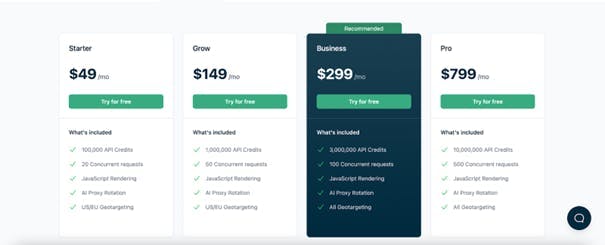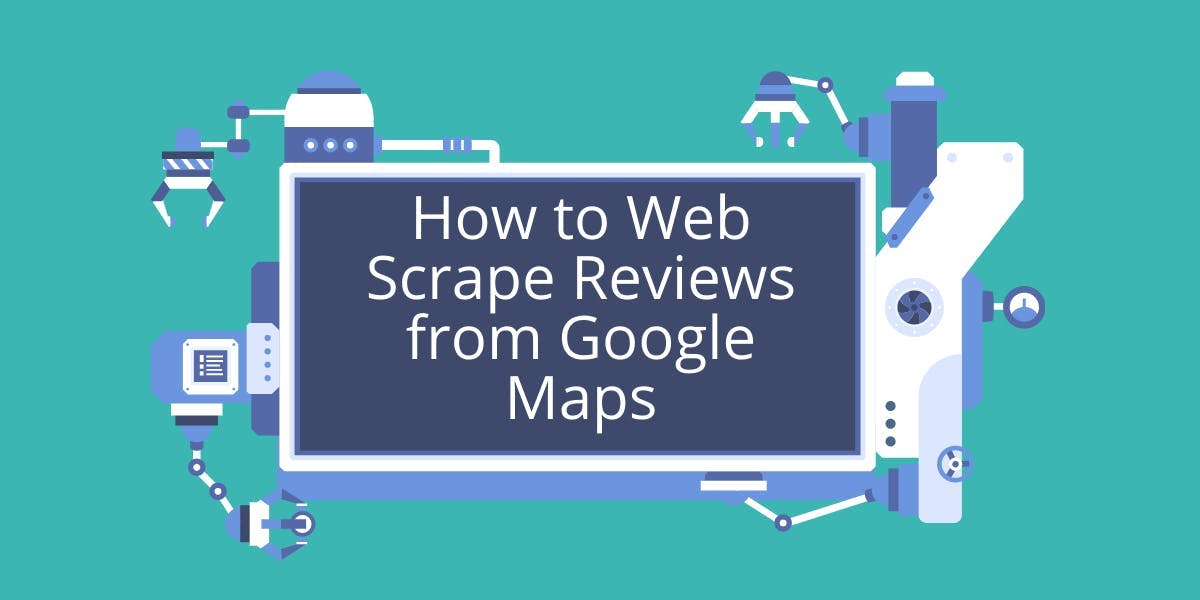Top 7 Best Google SERP APIs (Free & Paid)
Andrei Ogiolan on Apr 26 2023
Introduction
Web scraping is the process of extracting data from a website and using it for a variety of purposes. It can be a useful tool for businesses looking to gather information on their competitors, for individuals looking to track changes on a website, or for researchers looking to gather data for a study.
There are many different ways to scrape a website, but one of the most popular methods is using an API. An API, or application programming interface, is a set of rules and protocols that allow different software programs to communicate with each other.
What is SERP?
SERP stands for Search Engine Results Page. It is the page that is displayed to a user after they enter a query into a search engine, such as Google, Bing, or Yahoo. The SERP contains a list of results, also known as "search results," that are relevant to the user's query. These results can include web pages, images, videos, and other types of content. The SERP also includes other elements such as sponsored ads, local packs, featured snippets, and more.
SERPs are constantly changing and evolving as search engines continue to improve their algorithms and add new features. The layout, format, and content of SERPs can vary depending on the search engine, the query, and the location of the user. Understanding the SERP and what appears on it is crucial for SEO and SEM professionals, as it helps them to understand how their website is performing in search engine results and what they can do to improve their visibility and performance.
When it comes to scraping Google's search engine results pages (SERPs), there are several APIs available, both free and paid. In this article, we'll take a look at the top 7 Google SERP APIs and compare their pros and cons.
1.WebScrapingAPI
The first option we are going to explore is WebScrapingAPI as it brings the best value for money compared to others in the list.
WebScrapingAPI can be used by developers to scrape the web and has a lot of great features such as residential proxies, JavaScript rendering, CSS extracting, CAPTCHA bypassing, IP rotation, and evasions which gets them rid of the stress of being banned. It is very easy to use and all you need to do is to send your API KEY and a search query in an API call, just like this: https://serpapi.webscrapingapi.com/v1?engine=google&api_key=<YOUR-API-KEY>&q=Steve%20Jobs and that’s it, you are now ready to receive your results back. On top of that, this service offers a lot of dedicated scrapers for Google or Amazon, making it a great option for businesses or individuals who want to affordably scrape data from these websites and use it for different purposes.
When it comes to pricing, WebScrapingAPI has something for everybody with pricing starting from as little as 49$ per month for 100.000 API calls to an Enterprise plan for those who want to scrape the web at a large scale and need more than 10.000.000 API calls. The cost per request may vary depending on whether you use rendering JavaScript or residential proxies from 1 to 25 API credits.

This service also offers you the chance to try all products and features for free for 7 days with no credit card required, thus enabling you to find out how closely it satisfies your needs before you purchase a subscription. In case you encounter any issue with the product, you can easily get in touch with their technical support and someone will get back to you very soon, usually within a couple of hours.
Pros: By far best value for money from this list. This API is feature-rich, has great customer care and it is suitable for every budget.
Cons: Does not provide the response in many different formats such as CSV as some other options from the list, but you can easily convert the data using an JSON to CSV parser.
2.Apify
The second option we are going to explore is Apify which provides a great Google Scraping service.
The API allows users to extract data from Google search results pages in real time and offers a variety of options for customizing the scrape, such as the ability to search for specific keywords, retrieve data on specific SERP elements, and scrape results from multiple countries and languages. Additionally, the Apify platform offers an actor library of pre-made scraping and automation tasks, which can save time and effort for users who need to perform repetitive scraping tasks. The platform also offers a cloud storage for the scraped data which can be easily exported to different formats and a feature called Autoscaled Pool of Headless Browsers that allows to run multiple concurrent scraping tasks. Apify's Google scraping API is a valuable tool for businesses, researchers, and individuals looking to gather data on search trends, track changes in SERPs, and gather data on competitors.
When it comes to pricing, Apify has a pay-as-you-go pricing model, which means that users are charged based on the number of page loads and the amount of data scraped. The exact pricing can vary depending on the specific scraping needs of the user. It's worth mentioning that Apify offers a free trial with a certain amount of free page loads and storage, so you can test the platform and see if it meets your scraping needs before committing to a paid plan.
Pros: Offers a lot of scrapers and flexibility, thus being suitable for a lot of different scraping needs.
Cons: Price and monitoring systems can become confusing, especially at a greater scale.
3.Serp API
Another option we are going to explore is SerpAPI which is a service that allows users to scrape Google's search engine results pages (SERPs) in real time.
SERP API is a powerful web scraping tool specifically designed to scrape Google's search engine results pages (SERPs) in real-time. One of the key features of SERP API is its ability to scrape SERPs from multiple countries and languages, which allows users to gather data on search trends in different regions. Additionally, SERP API offers an extensive list of endpoints, which allows users to retrieve specific types of data from SERPs, such as organic search results, paid search results, featured snippets, local packs, images, videos, etc.
Another great feature of the service is its ability to handle CAPTCHAs, which can be a common issue when scraping Google SERPs. This allows users to continue scraping even when faced with CAPTCHAs, without having to manually solve them.
SerpAPI also offers a user-friendly dashboard that allows users to monitor the usage and track the progress of the scrapes and also offers support for users who need help getting started or troubleshooting issues.
This API stands out by being extremely feature-rich having scrapers for very many different engines such as:
- Google Maps API
- Google Scholar API
- Google Finance API
- Google Reverse Image API
- Google Immersive Product API
- Google Local Services API
- Google Lens API
- and more..
While most of the engines offer high quality data fastly and provide great documentation which is very easy to follow, at the time of writing this article there are a few engines that do not work as intended, but their team is currently working on fixing these issues, so you can expect that to improve soon.
When it comes to pricing, it starts from $50 for 50,000 Google searches per month and can get expensive at a larger scale so it is definitely not as cheap as some of the other options from this list.
Pros: It is the option with most features from this list with great documentation making them very easy to use. This service offers a beautiful playground for you to use and test if the product satisfies your needs before committing to a paid subscription.
Cons: The pricing is quite expensive and some engines are currently unreliable.
4.SerpWow
The fourth option we are going to talk about is SerpWow which provides an easy-to-use Google Search API.
This service is powerful and it enables the developer to retrieve SERP data in real time, which can be used to build SEO tools, track keyword rankings, and analyze search engine performance. SerpWow uses a wide variety of proxies, thus getting the users rid of the worry of being banned and giving the data back in either JSON, CSV, or HTML. On the other hand, at the time of writing this article, they are not as feature-rich as other options from this list and provide scrapers only for a few Google engines.
When it comes to pricing, it starts from $45 for 5000 Google searches, and as you may already have noticed it is very expensive compared to other options. SerpWow is intended more for Big Data purposes, having the most plans designed for Big Data from this list. In this case, the prices are starting from 500$ per month for 100.000 searches and get as expensive as 6300$ per month for 3.000.000 searches.
Pros: This service offers an easy to use Google Scraping API which returns the data back in various formats.
Cons: It is very expensive and not as feature-rich as other options.
5.OxyLabs
The next option we are going to talk about is OxyLabs which is a professional scraping company that can help businesses and individuals to extract data and insights from the search engines to improve their online performance.
OxyLabs is a very well-known company in the scraping world and they developed a SERP solution that is high quality and reliability that uses proxy rotation in order to avoid getting banned. This service offers a fast SERP API and they provide in-depth tutorials by providing many code samples showing how to integrate their API into your product.
But, same as the last option on the list it is very expensive with plans starting from 99$ per month for 29.000 requests (limited to 15 results per request) and getting as expensive as 10.000$ per month for more than 10.000.000 searches (no search limits per results).
Pros: This service offers a fast, reliable and scalable Google SERP solution.
Cons: It is very expensive and not as feature-rich as other options.
6.SerpStack
The sixth option we are going to explore is SerpStack, a product developed by Apilayer, a software company based in London.
While this product was designed first for internal needs, it has grown to become one of the most reliable products in the marketplace. The Serpstack API allows automated retrieval of SERP data from search engines by utilizing a proxy network. With solid documentation, they make scraping Google an easy and straightforward process for developers.
When it comes to pricing it is more affordable than other options from the list, starting from 30$ for 5.000 searches and getting as expensive as 200$ per month for 50.000 searches. It is worth mentioning that if you need scraping at a larger scale this service also offers a custom Enterprise plan designed for such needs. In order to learn more about you need to get in touch with their sales team.
Pros: This service offers a cheap and reliable Google SERP solution.
Cons: It is not as feature-rich as other candidates.
7.DataForSEO
Lastly, we are going to talk about the SERP API offered by DataForSEO, a provider that offers a variety of tools and services that allow businesses and individuals to gather data on search engine rankings, keywords, backlinks, and other important SEO metrics.
The SERP API from DataForSEO is very flexible and suitable for those who are not sure how many requests are going to consume in a month, having a pay-as-you-go policy. This API is great and lets you scrape Google Search Engine and receive back high-quality data in a reasonable amount of time.
Having a pay-as-you-go payment system makes the price quite confusing and expensive for those who need Google scraping at a larger scale. It is more suitable for those who do not need as many API calls and do not have a constant number of calls per month.
Pros: Flexible and great for digital marketers or SEO consultants.
Cons: Gets expensive when scraping at scale and it is not as feature-rich as other options from the list.
Conclusion
In conclusion, I hope this article gives you an overview of the Google SERP available services in the marketplace. The ability to scrape Google's search engine results pages (SERPs) can be a valuable tool for businesses, researchers, and individuals looking to gather data on search trends, track changes in SERPs, and gather data on competitors.
There are several options available for scraping Google SERPs and it is extremely important to consider the specific needs of your business or project and to carefully evaluate the features and limitations of each service.
News and updates
Stay up-to-date with the latest web scraping guides and news by subscribing to our newsletter.
We care about the protection of your data. Read our Privacy Policy.

Related articles

The definition and uses of online job scraping. Advantages and disadvantages of job scraping along with strategies and potential risks.


Learn how to scrape Google Maps reviews with our API using Node.js. Get step-by-step instructions on setting up, extracting data, and overcoming potential issues.


Learn how to use Python for web scraping HTML tables: Extract, store & analyze data | Beginner-friendly tutorial
